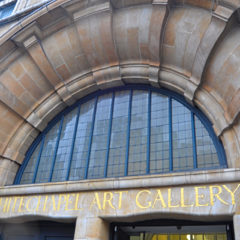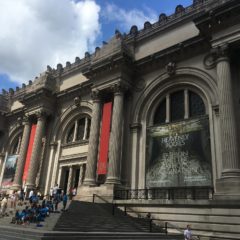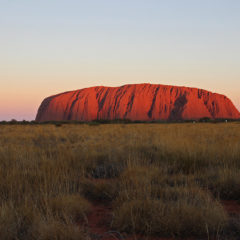Of Mud & Flame
by Joseph Brooker Penda’s Fen is a 90-minute television film made for the Play for Today slot and screened in 1974. Its content and history are discussed already on a post here. Though received with interest at the time, it then dropped out of sight for over fifteen years, and did not truly come back to view till the twenty-first century. In 2016, when Penda’s Fen had earned the phrase ‘cult film’ more than most, it was issued on DVD by the BFI. A year later, two postgraduate researchers from Birkbeck’s Department of English & Humanities, Matthew Harle and James Machin, organized a conference, Child Be Strange, at the BFI to celebrate and explore the film, ahead of a commercial screening. The Centre for Contemporary Literature supported this conference, and two of its members – Professor Roger Luckhurst and I – have contributed to a subsequent volume that developed from the conference and was published in late 2019. Of Mud & Flame, edited by Harle and Machin, is the fullest assembly of material on Penda’s Fen that is ever likely to exist. It contains versions of papers given at 2017’s event (including Roger Luckhurst on contexts of the 1970s, Adam Scovell on the subgenre of Folk Horror, Carolyne Larrington on women in the film, and Beth Whalley on Medieval sources), along with wholly new essays, interviews with key actors from the film, a foreword and afterword by scriptwriter David Rudkin, and the entire script of the film. A remarkable demonstration of the richness of the film, the book also represents the outcome of a collaborative process initiated by Harle and Machin at Birkbeck. In February 2020, events were held to promote the book, at the BFI, London Review Bookshop, and Whitechapel Gallery. On 29th February I attended the last of these events, where the film was introduced by the erudite Medievalist Beth Whalley and the unstoppable curator Gareth Evans. I must now have seen this film half a dozen times, but this was the first on the big screen. It made me concentrate differently and see even more than several previous viewings had highlighted – like the detail of the music, the Dream of Gerontius, in the first scene; the whole motif of the dissonant musical representation of God had passed me by. Most of the film is now so familiar, to so many, that it could be a Rocky Horror Penda Show, cult-TV fans intoning the dialogue as it comes. The scenes don’t, though, follow a very obvious order; apart from protagonist Stephen Franklin’s gradual journey from conservatism to discovery, they feel discrete, as though they could often be...
Transitions 9
21st March 2020, 09:30 — 18:00 B35, Birkbeck Main Building Book your place now Transitions: New Directions in Comics Studies is an annual one-day symposium promoting new research and multi-disciplinary academic study of comics / comix / bande dessinée / manga / and other forms of sequential art. The Transitions symposia have been a fixture on the UK comics scholarship landscape, with a focus on new voices and novel approaches in comics research. The programme emphasises a range of approaches in research, and especially invites participation from research students and early career researchers. This year, we are pleased to host two international keynote speakers: Prof. Dr. Sylvia Kesper-Biermann (Universität Hamburg) and Dr. Nick Sousanis (San Francisco State University). The symposium will start at 09.30-18.00, followed by a reception. Lunch will be provided. If you have any dietary requirements, please let us know in the special requests box on the booking form. Attendance is free, but registration is essential. Due to limited availability, please make sure you can attend before registering. Further information about Transitions and previous symposia can be found at http://www.ccl.bbk.ac.uk/events/transitions-symposia/ For questions please contact us at transitions.symposium@gmail.com. Transitions is organised with assistance from the CHASE research consortium and the Centre for Contemporary Literature at Birkbeck. ...
Notes on Camp 2019
by Dickon Edwards At the end of each year, critics like to put out their lists of highlights. In a similar vein, the following represents my own survey of the year 2019 in terms of the books and other media which affected my field of research. My field is camp modernism. ‘Camp’ as in the aesthetic of exaggeration and parody, often with implications of identity, and literary ‘modernism’, as in the innovative literature of the early twentieth century. My argument is that the best examples of camp modernism in literature are the works of a British writer who tends these days to be overlooked, Ronald Firbank. Firbank published a series of novels from 1915 to his death in 1926, including Vainglory, Valmouth, and The Flower Beneath the Foot. He is described in Susan Sontag’s 1964 essay ‘Notes on Camp’ as one of the two ‘conscious ideologists of camp’, the other being Oscar Wilde.[1] In May 2019 Sontag’s essay was used as the theme to one of the biggest events in the American celebrity and fashion world – the opening gala for the summer exhibition at the New York Metropolitan Museum of Art’s Costume Institute. Or as it’s usually known more simply, the Met Gala. This year’s gala required guests to interpret the exhibition’s title, ‘Camp: Notes on Fashion’. Among the guests was Billy Porter, the actor from the TV series Pose, which narrates the lives of trans people of colour during the New York drag balls of the late 1980s. At the Met Gala, Porter dressed in gold lamé as an androgynous Egyptian-like deity from the ancient world, carried on a litter by a group of half-naked men in similarly ornate Egyptian veils, matched more anachronistically with gold painted jeans. On Twitter, Porter supplied his own annotation to his costume: ‘The Category Is: Old Testament Realness.’[2] Viewers of Pose, or indeed RuPaul’s Drag Race, will recognise that statement as a catchphrase from drag contests. The serious implication is that camp plays with the idea of categories as received structures of power. Camp asks what defines such categories, who defines them, what they mean, and why they exist at all. I was reminded of the way that modernism, too, is a much-questioned category, and that it’s works like Firbank’s novels or Virginia Woolf’s Orlando (1928) which bring this interrogative aspect of camp into the category of literary modernism. Happily for me, the catalogue accompanying the Met exhibition begins with a epigraph from Ronald Firbank’s Vainglory (1915), one which also relates to Billy Porter’s costume: ‘If we are all a part of God then God must indeed be horrible’.[3] As Firbank’s...
Such Stuff As Dreams Are Made On
Patti Smith, Year of the Monkey by Karina Cicero Patti Smith dreams and writes, writes and dreams, walks, sleepwalks, questions and converses with all manner of signs in her latest memoir. Drawing on events of the last year she spent with her close friends Sandy Pearlman and Sam Shepard, she revisits focal points in her career, enclosures previously visited, landscapes she had never seen but feels lured to, and recreates conversations that have never (and may) not take place in the realm of the real, all under the auspicious protection of the year of the monkey (2016) in the lunar calendar. The main protagonist is the process of dreaming and its outcomes. Dreaming takes on an elastic function in Smith’s narrative, as she blurs the boundaries between sleeping and wakefulness, bringing in elements of the unconscious into her waking moments: ‘I actually watched myself fall asleep’ (58). Her chronicles are ornamented with uncanny discoveries of candy wrappings, ‘All opened, yet not a trace of chocolate’ (11), and signs that voice enigmatic messages – ‘There are many truths and there are many worlds’ (23) – as she embarks on a quest for clues: a process fashioned after the detective novels she hopes to write one day or, some might argue, a tribute to Roberto Bolaño’s 2666. An obvious and almost expectable intertextuality with Alice’s Adventures in Wonderland lurks in the narrative, blaming on the magnetic power of the Dream Inn sign the distorted images her minds summons, likening her to ‘Alice herself, glumly presiding over an endless tea party’ (6).The only difference from that classic text is that Patti knows exactly where she is heading and who is waiting for her (or no longer will be) at the end of this fateful year. Smith does not limit herself to comment on the reality she witnesses; she transcends images and appearances to explore the soul behind an inert neon sign, or a bowl of soup. The narrative in Year of the Monkey blurs the lines that divide the present from the future and from the past. These are obliterated to give way to a constant criss-cross of temporality, like the moment when she has an epiphany about taking a trip to see Ayers Rock, in Uluru, and her interlocutor assures her she has already started that trip – in her mind: ‘The soles of your shoes are already red’ (104). It is not surprising to discover her longing to visit Ayers Rock. In Smith’s world, life is an ever-present punctuated by focal points, which illuminate certain periods of her life but lead up to any other point in the past and...
Transitions 9: Call for Papers
CALL FOR PAPERS: TRANSITIONS 9 – new directions in comics studies 2020 Birkbeck, University of London Saturday 21st March 2020 We are delighted to announce a call for papers for the Transitions 2020 symposium. Transitions is a platform for emerging research in comics that is free to attend and participate in. This event is focused towards postgraduate and early career speakers, and usually draws a diverse crowd of both new and more established researchers, as well as creators, aficionados and other interested parties. Our aim is to build connections between comics scholars working in diverse academic departments and contexts, to provide a platform for productive debate, and to create a space from which further collaborations can emerge. Keynote speakers: Prof Sylvia Kesper-Biermann (Universität Hamburg) and Dr Nick Sousanis (San Francisco State University) Respondent: Professor Roger Sabin (University of the Arts London) Rather than adopting a narrow theme, the shape and identity of the programme will emerge from the submitted papers. We thus welcome abstracts for 20 minute papers, or pre-constituted panels of three, on topics including (but not limited to): Comics, comix, comic strips, graphic novels, manga, manhwa, bande dessinée, superheroes, adventure, war, horror, fantasy, crime, romance, humour & other genres; documentary/historical/journalistic comics, autobiographical/biographical modes, graphic medicine, politics of representation in comics, formal approaches, transgressive comics, educational and didactic comics, comics for young adults & children, readers and fandoms, creators, comics & the law, publishing histories, web-comics & comics exhibitions, transnational circulation, political economy of comics Please send your proposal to transitionssymposium@gmail.com. Please attach your abstract of 250-300 words plus a short biographical note (preferably as a Word document), indicating ‘abstract’ in the email subject line and your name in the file’s title. This year we are also seeking volunteers to sketchnote / visually record each panel, in order to compile a visual record of the day. If you’d be interested in recording a panel, please email us a couple of (low-res) images or a link to an online portfolio at the above address with ‘sketchnoting’ in the subject line. You do not need to be submitting a paper to take part in this. The deadline for submissions is 1 January 2020. We aim to notify applicants by Friday 17 January. Click here to view the call for papers as a PDF. With best wishes, The Transition Team ...
Organic Systems: Session 4 – report
by James Burton The fourth and final event in the CHASE Organic Systems series took place in the Dana Studio at London's Science Museum. We were hosted by curator and researcher Glyn Morgan, who is in the process of developing a major exhibition on science fiction that will open at the museum in 2021. In the morning training session, Dr Morgan introduced us to the wide range of opportunities for research collaboration offered by the museum, including support for preparing collaborative funding applications, the on-site research library, and the Collaborative Doctoral Partnership scheme. We also learned about some of the many archives and holdings of the museum relevant to our interests, such as the huge James Lovelock archive (including patents, school reports, letters, prototype inventions and much more). Glyn also offered some fascinating historical examples that reveal the cultural, historical and theoretical intertwining of our key themes of science, fiction and ecology, such as the influence of pioneering radiation researcher Frederick Soddy on H. G. Wells (and vice versa). The session was followed by a short museum tour in which participants’ attention was directed to some of the long-term exhibits relating to our discussions, including the landers and of the 'Exploring Space' section of the museum, and a replica of the 'Clock of the Long Now'. In the afternoon, Roger Luckhurst introduced and moderated our first workshop session, which saw Glyn Morgan joined by two inspiring and thought-provoking interlocutors: Hugo-award-winning historian and critic of science fiction Farah Mendlesohn, and architect, educator and researcher Amy Butt, who draws on science fiction as a critical resource across her practice and teaching. Farah Mendlesohn opened the discussion with several provocative ideas about the changing historical and cultural status of “waste” in relation to a number of questions of environmental and ecological transformation. All three panellists drew on different works of SF (such as Kim Stanley Robinson’s Aurora and Chen Qiufan’s Waste Tide) in exploring different creative and political ways of engaging with and (re)thinking these issues. In the latter part of the session, participants were divided into groups and took part in an interactive exercise conceived and led by Amy Butt, using physical materials and ideas from SF narratives to explore speculative ecologies of plastic, considering questions of waste, recycling, and the imbrication of different environments, networks and agents. The exercise gave rise to several (often surprising) lines of exploration and discussion around our key issues, as well as reflections on the value of SF for critical and speculative research. In the final session of the day, a collective of early career researchers working at Birkbeck and Goldsmiths (the two institutions organising the...








Recent Comments